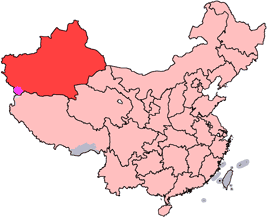2007 Xinjiang raid: Difference between revisions
Adding link |
Inclusion of a relevant account of the events. In Spanish, though. |
||
| Line 22: | Line 22: | ||
In reaction, many exiled [[Uyghur people|Uyghur]] leaders quickly have questioned the motives behind the raid. [[Rebiya Kadeer]], Uyghur human-rights activist, has called for an independent [[UN]] investigation into the raid, while [[Alim Seytoff]], executive chairman of the [[World Uighur Congress]], claims the [[Government of the People's Republic of China|Chinese government]] has yet to produce evidence to substantiate the camp's connections to terrorism. In response, [[Zhao Yongchen]], vice head of the Xinjiang counterterrorism forces, reiterated the reality of the camp's terrorist threat. <ref name=LOCATION/><ref name=REACTIONS>[http://www.taipeitimes.com/News/world/archives/2007/01/10/2003344141 China crushes Xinjiang `terror camp'] Taipei Times</ref> |
In reaction, many exiled [[Uyghur people|Uyghur]] leaders quickly have questioned the motives behind the raid. [[Rebiya Kadeer]], Uyghur human-rights activist, has called for an independent [[UN]] investigation into the raid, while [[Alim Seytoff]], executive chairman of the [[World Uighur Congress]], claims the [[Government of the People's Republic of China|Chinese government]] has yet to produce evidence to substantiate the camp's connections to terrorism. In response, [[Zhao Yongchen]], vice head of the Xinjiang counterterrorism forces, reiterated the reality of the camp's terrorist threat. <ref name=LOCATION/><ref name=REACTIONS>[http://www.taipeitimes.com/News/world/archives/2007/01/10/2003344141 China crushes Xinjiang `terror camp'] Taipei Times</ref> |
||
According to Rafael Poch, at the time correspondent in China for the Spanish journal [[La Vanguardia]], the whole incident was the result of a local altercation between Uyghurs and Chinese authorities, with the privatization of a local coal mine as the cause. After one policeman was killed in the riot, Chinese security forces shot dead several local Uyghurs who had sought refuge in nearby mountains, later covering up the entire event as a "counter-terrorist operation".<ref>[[Un incidente en el Pamir - Diario de Pekin - 20/06/2007]]</ref> |
|||
==See also== |
==See also== |
||
Revision as of 15:30, 8 July 2013
| Xinjiang raid | |||||||
|---|---|---|---|---|---|---|---|
| Part of Xinjiang conflict | |||||||
 | |||||||
| |||||||
| Belligerents | |||||||
|
|
| ||||||
| Commanders and leaders | |||||||
| Ba Yan | Unknown | ||||||
| Casualties and losses | |||||||
|
1 KIA 1 wounded |
18 KIA 17 captured | ||||||
The January 2007 Xinjiang raid was carried out on January 5, 2007 by the Chinese police against a suspected East Turkestan Islamic Movement training camp in Akto County in the Pamir plateau near the border between Afghanistan and Pakistan.[1]
A spokesperson for the Xinjiang Public Security Department said that 18 terror suspects were killed and 17 captured. The raid also resulted in the death of one Chinese paramilitary officer Huang Qiang, age 21, and the injury of another officer. Authorities confiscated hand grenades, guns, and makeshift explosives from the site.[1][2]
In reaction, many exiled Uyghur leaders quickly have questioned the motives behind the raid. Rebiya Kadeer, Uyghur human-rights activist, has called for an independent UN investigation into the raid, while Alim Seytoff, executive chairman of the World Uighur Congress, claims the Chinese government has yet to produce evidence to substantiate the camp's connections to terrorism. In response, Zhao Yongchen, vice head of the Xinjiang counterterrorism forces, reiterated the reality of the camp's terrorist threat. [1][3]
According to Rafael Poch, at the time correspondent in China for the Spanish journal La Vanguardia, the whole incident was the result of a local altercation between Uyghurs and Chinese authorities, with the privatization of a local coal mine as the cause. After one policeman was killed in the riot, Chinese security forces shot dead several local Uyghurs who had sought refuge in nearby mountains, later covering up the entire event as a "counter-terrorist operation".[4]
See also
- East Turkestan independence movement
- East Turkestan Liberation Organization
- 2008 Uyghur unrest
- Politics of the People's Republic of China
References
